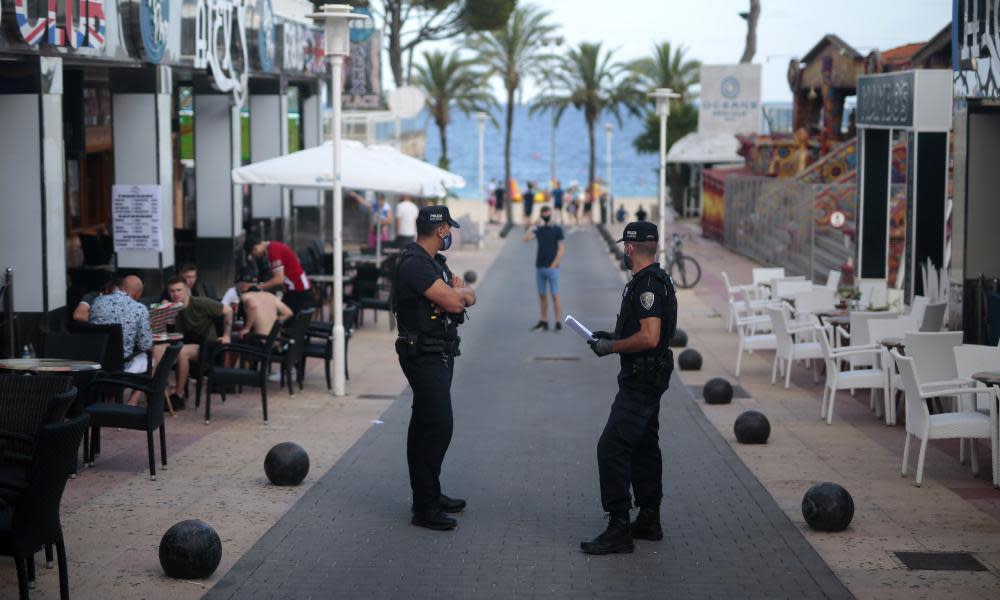Germany's Covid-19 fears grow over ‘reckless’ partygoers

Young Germans partying abroad on Europe’s beaches and ignoring physical distancing rules are becoming an increasing cause of concern at home, as coronavirus cases continue to rise across the world.
Following widespread reports earlier this month of German tourists revelling on the Spanish island of Mallorca, bars and clubs on the infamous “Bier Straße” were forced by local authorities to close.
Many Germans have since cancelled Mallorcan holidays, and are flocking instead to Bulgaria – particularly to the resort town of Golden Sands on its Black Sea coast.
Large numbers of German travellers are also ignoring government warnings issued earlier this week to avoid areas in Spain, including Catalonia, Barcelona and the Costa Brava, as well as the regions of Aragon and Navarra, due to rising numbers of coronavirus cases there.
Lothar Wieler, of the Robert Koch Institute (RKI), the government’s main advisory body on public health, called the partygoers “irresponsible”.
“It is reckless and careless to take part in wild parties,” he said during his latest update of the virus’s progress. “Young people can carry the illness back to their families, especially their grandparents.”
Footage of revellers in Bulgaria was prominent in German media on Wednesday. Particular focus was placed upon the phenomenon of “foam parties”, in which holidaymakers wearing large swimming rings – apparently to enable them to physically distance from each other – dance in pools of flying foam.
Participants have their temperatures measured before being allowed in, and are advised to drink out of their own cups rather than share them. The parties are labelled “corona-free zones” by the organisers.
However, pictures showed people dancing at close quarters, and participating in close-contact drinking games.
default
Bulgaria’s initial coronavirus outbreak was comparatively small by European standards, but the number of cases is rising fast. Unlike in Spain, Bulgaria has not introduced a rule requiring people to wear masks.
Nikolai Veler, a club owner at Golden Sands, told German television he was powerless to control the partying. “People are allowed to do what they like here,” he said. “I can do nothing to stop them, particularly when the government doesn’t say they must be thrown out if they’re not wearing masks.”
Earlier this month, Jens Spahn, the health minister, said he was appalled by reports of partying German tourists in Mallorca, who were blatantly ignoring Spain’s coronavirus rules, such as wearing a mask, or keeping a distance of 1.5 metres.
“I’m not a party pooper,” he said. “But this is simply not the time for that.”
According to the RKI, there are 6,500 active coronavirus cases in Germany On Wednesday, the RKI registered 684 cases over 24 hours, compared with a daily rate of about 300 to 400 for the past few weeks.
“We have been neglectful, that is the reason,” Wieler said of the “worrying” rise in cases. “We achieved so much in the past few months in Germany and were mastering the pandemic very well. We all contributed to the sinking rate of infection so as not to overload our health system. We should celebrate this success, but we shouldn’t sit on our laurels.”
He urged Germans to remember that a holiday was not an excuse to ignore the rules. “Be sensible,” he said. “Your holiday is no less important than your work or private life in terms of taking precautions.”
The RKI has 130 countries registered as high-risk areas. While Germans are strongly advised not to visit those countries, if they do they are required to go into quarantine on their return. Spahn has said the government will introduce obligatory testing for them, probably from next week.
Gerd Fätkenheuer, an infectologist at Cologne’s University Clinic ,said having reduced the rate of coronavirus Germans felt much safer now than they had three months ago. “This poses a big risk,” he told the Kölner StadtAnzeiger. “Dangers related to the virus are not being taken seriously by enough people”.
While returnees are seen as a potential problem, many see the dangers at home as just as high as abroad, if not more so.
“Family parties, weddings, meetings with friends, these are the source of the majority of cases,” said Ute Rexroth, of the RKI. “Holidaymakers returning from abroad are among those we’re seeing with the virus, but most new infections are actually occurring in Germany”.

 Yahoo News
Yahoo News 
